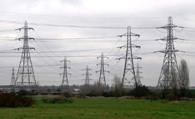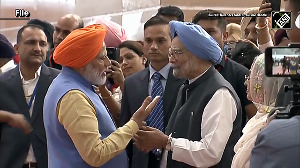 Several commercial and residential customers of Reliance Infrastructure (R-Infra) in Mumbai are planning to shift their electricity connections to Tata Power Company (TPC).
Several commercial and residential customers of Reliance Infrastructure (R-Infra) in Mumbai are planning to shift their electricity connections to Tata Power Company (TPC).
Around 4,000 restaurants in Mumbai and its suburbs say the shift to TPC would work out to be over 50 per cent cheaper for them. The restaurants which have sought a change of supply include fine dining and mid-size restaurants and fall under R-Infra and TPC's licence areas.
"We have written to both the companies and the regulatory board Maharashtra Electricity Regulatory Commission (MERC) for a shift from R-Infra to Tata Power. It would be around 50 per cent cheaper for us," says Chandrahas Shetty, president of a restaurants' association in Mumbai.
R-Infra's licence area spreads from Sion to Kanjurmarg in Central suburbs and from Mahim to Mira-Bhayander in the western suburbs of Mumbai. TPC's licence area overlaps with that of R-Infra.
R-Infra's consumer base is largely residential, forming around 85 per cent of its customer base, with commercial users comprising 14 per cent.
"TPC states that it will be able to supply power to those existing consumers of R-Infra who wish to receive power from TPC. For effecting supply, TPC would use the existing distribution system of R-Infra," MERC stated in a recent interim order given on a petition filed by TPC. The company had sought approval for operating procedures for supplying power to consumers in the common licence area of R-Infra using each other's existing distribution network.
While Tata Power did not want to comment ahead of the announcement of its second quarter results, an email sent to R-Infra remained unanswered.
Restaurant owners point out that, after the tariff orders were passed in June this year, there was a huge difference between the tariffs of both TPC and R-Infra.
"MERC has allowed TPC to propagate their lower rates and consumers would get huge savings with the switch-over," says Shetty.
MERC, in a report on R-Infra's distribution business on its website, says that the tariff for most consumer categories in R-Infra's licence area is 100 per cent to 150 per cent higher than the tariff applicable for most TPC consumers in the same category.
"There have also been several submissions stating that the tariffs charged by R-Infra are much higher than that charged by TPC to their consumers. The average cost of supply of R-Infra has been increasing by around Re 1 per kWh (kilo-Watt hour) every year, from the financial year 2006-07, thus requiring an average tariff increase of around 24 per cent every year, which is impractical," says MERC.
However, MERC adds that the higher tariffs from R-Infra are on account of the steep rise in capital expenditure, as well as in power purchase expenses due to a failure on the part of R-Infra to enter into long-term contracts for the required quantum of power purchases.
According to tariff details on MERC's website, while TPC charges Rs 1.30 per month as energy charge on a unit (equivalent to kWh) on use of 0-100 units, R-Infra charges Rs 2.96 per month on the same from its residential customers. Fixed charges for both companies remain Rs 30 per month.
For commercial customers, while TPC charges a fixed rate of Rs 150 per month, R-Infra charges Rs 200 per month. TPC's monthly charge a unit is Rs 3.85 against Rs 7.95 charged by R-Infra.








 © 2024 Rediff.com -
© 2024 Rediff.com -